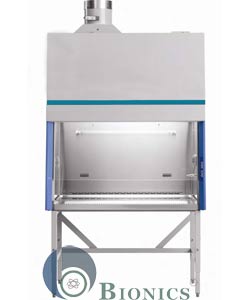Yes, Good microbiological safety cabinet Do Exist
Class 2 Biosafety Cabinets – Vital for Lab Safety and Biological Containment

Modern laboratories prioritise safety for workers, materials, and environments. Whether it's conducting biological tests, diagnostics, or experiments with infectious agents, biosafety cabinets form the backbone of contamination control.
Class 2 Biosafety Cabinets are widely adopted for offering three-way protection. These units are essential for labs working with infectious materials or clinical diagnostics.
Biosafety Cabinets – How They Work and Why They Matter
Biosafety cabinets are airflow-controlled workspaces engineered for microbiological safety. They use advanced filters to trap harmful particles before air re-enters the lab.
These units are generally classified into three categories—Class I, Class II, and Class III. Among these, Class 2 cabinets are the most versatile and commonly used.
Defining Class 2 Biosafety Cabinets and Their Role
Class 2 Biosafety Cabinets offer simultaneous protection for people, processes, and surroundings. They utilise downward laminar airflow within a sealed system.
Air is treated using dual filtration systems to ensure safe circulation and exhaust. These cabinets are ideal for work involving moderate-risk pathogens (BSL-2/3).
What Makes Class 2 Cabinets Effective in Labs
A Class 2 microbiological safety cabinet includes several integrated safety mechanisms such as:
• Medical-grade filters for capturing contaminants
• Steady air movement to reduce airborne particle circulation
• Negative pressure barriers to prevent leakage
• Built-in UV sterilisation for decontaminating surfaces
• Low sound emissions to reduce fatigue
• Front glass for full control and protection
These elements support lab workers in maintaining sterile working environments.
Where Class 2 Cabinets Are Used
Class 2 Biosafety Cabinets are commonly used across microbiology, biotechnology, diagnostics, and pharma. They are indispensable for handling clinical specimens, blood cultures, and biological reagents.
From universities to private pathology labs, Class 2 cabinets ensure lab hygiene and sample integrity.
Why Laboratories Prefer Class II Safety Cabinets
Using Class 2 cabinets offers significant improvements in contamination control and user safety:
• Reduces the risk of sample cross-contamination and error
• Acts as a barrier between user and biohazard
• Ensures filtered air is safe for release or recirculation
These cabinets help labs meet safety regulations while maintaining workflow.
Regulatory Standards for Class 2 Cabinets
Top manufacturers ensure their cabinets meet certifications like NSF 49, EN 12469, and WHO recommendations. Class 2 units are sub-classified as A1, A2, B1, and B2—based on varying airflow balance and ducting needs.
• Type A2: Ideal for general-purpose labs
• Type B2: Suited for labs dealing with toxic agents
Matching the cabinet type to your process is essential.
Tips for Purchasing the Ideal Biosafety Cabinet
Before purchasing, consider:
• The types of agents and materials handled
• Cabinet dimensions, ducting needs, and room layout
• Energy consumption and maintenance frequency
• Warranty, training, and certification services
Partnering with a trusted provider helps meet both performance and safety needs.
Installation and Safety Guidelines
For optimal results:
• Avoid placing near doors, vents, or fans
• Ensure annual certification and airflow testing
• Educate staff on cabinet operations and safety
Operational best practices include:
• Use gloves, gowns, and face shields while operating
• Minimise hand movements inside the cabinet
• Decontaminate surfaces before and after use
• Use UV lights only when cabinet is off and unoccupied
Final Thoughts on Class 2 Biosafety Cabinets
Class 2 biosafety cabinets are vital equipment in laboratories dealing with biohazards. They protect workers, secure samples, and copyright environmental standards.
From pathology labs to advanced genetic testing, Class II microbiological safety cabinet cabinets copyright the highest biosafety levels. When investing in a biosafety cabinet, opt for trusted brands that offer end-to-end service—because your research deserves the best protection.